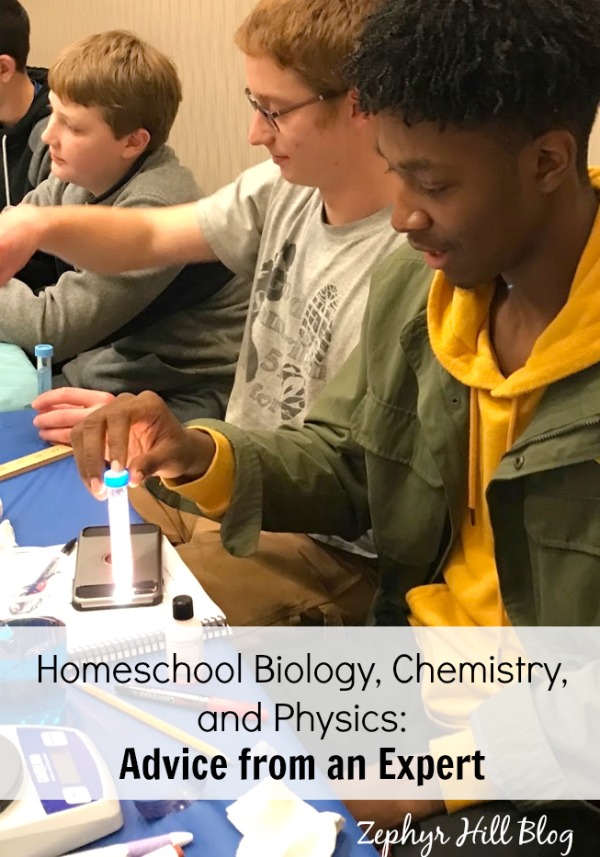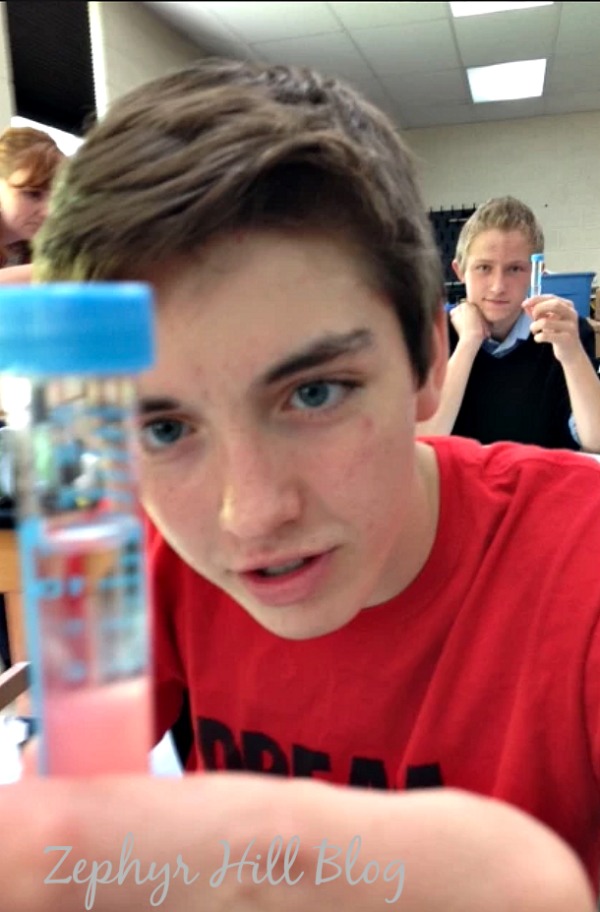
Has your experience with homeschool science been positive or negative? It can certainly be challenging when it’s not a subject that you’re fluent in. And it may get more difficult as your students grow and the curriculum becomes more complicated. Earlier this year, I shared some tips from science professor, Greg Landry. Here’s his latest advice about doing science right!
This guest post is sponsored by College Prep Science, copyright 2020
I recently talked with a homeschool mom of four children who echoed the sentiments of many homeschooling parents when she said, “my children had a bad experience with a science class.” The good news is that it doesn’t have to be that way.
Homeschool biology, chemistry, and physics curriculum, labs, and classes are the core of high school science and the thrust of middle school science as it prepares homeschooled students for high school level science. As a former college professor who has also taught thousands of homeschooled high school students, I believe that we should be careful at both of those levels to avoid two common mistakes.
Mistake No. 1
High school level homeschooled students who are likely to be college science majors should be taught very differently than students who will likely not be science majors and students who may not be attending college.
We created two separate types of classes to best address the biology, chemistry, and physics needs of each group – “college prep” and “life prep.” The depth, breadth, and pedagogy of many college-prep biology, chemistry, and physics classes leaves many non-science students frustrated, uninterested, and ultimately learning very little. I find that students in this situation often miss the big picture and they don’t have an overall understanding of the subject matter that is so critical in these sciences. They can’t see the forest because they’re lost in the trees. Our “life prep” classes are basic high school level classes, enable students to see the forest, and will allow them to learn science through the lens of their God-given interests and talents.”
Mistake No. 2
Ten years ago I originated the “pre” classes (Pre-Biology, Pre-Anatomy & Physiology, Pre-Chemistry, and Pre-Physics) as a means of minimizing the intimidation of high school level science and preparing middle school age students for specific high school level classes – rather than generalities such as “physical science” etc. This is a significant factor as they prepare for high school level science.
The thrust of our Christian / creationist worldview homeschool biology, chemistry, and physics online classes (and lab curriculum) is to give homeschooled students access to science that is focused on scientific inquiry, critical thinking, process reasoning, data collection, and the graphical and written representation of research. We want to prepare competent, confident students for their remaining high school years, their college years, and life.
Classes Offered
“College prep” online classes for students who will likely be college science majors
“Life prep” online classes for students who likely won’t be college science majors or likely won’t attend college
– Homeschool Biology – College Prep (9th-12th) – Two Semester Class
– Life Prep Homeschool Biology (8th-12th) – Two Semester Class
– Homeschool Chemistry – College Prep (10th-12th) – Two Semester Class
– Life Prep Homeschool Chemistry (9th-12th) – Two Semester Class
– Life Prep Homeschool Physics (9th-12th) – Two Semester Class
– Homeschool Human Anatomy & Physiology (9th-12th) – Two Semester Class
– Homeschool Pre-Anatomy & Physiology (6th-9th) – One Semester Class
– Homeschool Pre-Chemistry (6th-9th) – – One Semester Class
– Homeschool Pre-Biology (6th-9th) – One Semester Class
– Homeschool Pre-Physics (6th-9th) – One Semester Class
– Homeschool ACT Prep Bootcamp (8th-12th)
– Self-Paced Young Scientist Classes (3rd-6th)

In the words of a homeschool parent: “Greg, …what you did for our daughter will have far-reaching effects. You showed her that learning can be enjoyable…” Thankful in Indiana, Jim H.
Note: These online homeschool science classes also include lab experiments and graded lab reports in Professor Landry’s virtual homeschool science laboratory. Students attend class weekly (either live or by recording), turn-in homework, and are tested on a regular basis. These classes are all-inclusive and provide students with an enjoyable, comprehensive science experience.
Homeschool dad, scientist, and former college professor, Greg Landry, offers live, online homeschool science classes, Homeschool ACT Prep Bootcamp, the Homeschool Mom’s Science Podcast, in-person two-day science lab intensives nationwide, freebies for homeschool moms, and student-produced homeschool print publications.
Anne Marie, the expert advice you share here is great. Sounds like the perfect homeschooling program for students in quarantine who need help completing science credits.
What a great resource for homeschool science study! Having a source like this is invaluable, particularly as lab experiments are also included. I will be sharing this with friends who are homeschooling older children (Junior/ Senior High).
Thanks so much for sharing, Lynda!
So cool! I loved this subject when I was in school. This post is really helpful for those having to homeschooling and fit in science projects. Thank you for sharing!
I have had good science years and bad science years, directly related to the amount of time we had to spend significant time on all of the extra experiments and programs that we wanted to add to make it a more complete program. But such is life, isn’t it? Overall, it was a great experience.
This is perfect advice. Science was such a hard subject for me. I was so fortunate to have two years (different schools) where we made a nature exhibit on the school site. I didn’t get the proper “science” to make me feel comfortable. Anyway, reading this makes me want to go study!
I wish I could do my science over! Highschool was tough and I had to work through much of it alone.
I love how organized this is and the fact that you are acknowledging the different routes that these students may be taking. You’re right, those that aren’t planning on going to college for science don’t need the same skills that those who are going to college will require. By customizing it in this way, each of the students are more likely to get what they need out of their education.
Amazing informations that’s very much needed in our current times. I will be passing this onto my friend that is homeschooling her kids.
This is great information! I’m a fan of the homeschooling movement, when done well, as I think the kids get much more from the individual attention. Thanks for creating these programs and sharing this info.
This is awesome advice for families! What a great resource for a homeschool science study!
Very great information! Thank you for sharing all this advice which is perfect for homeschooling during quarantine!
Kudos to you for putting this together. As a biologist myself, my teachers definitely shaped my enthusiasm for science at a young age. I’m sure this teaching curriculum will also spark joy and curiosity.
I couldn’t imagine having to homeschool high school chemistry or physics right now. Thank you for all this information
Great bunch of advice! These will be so helpful for homeschool parents struggling to teach science!
Thankfully my children are younger so I don’t have to deal with this….yet. A great resource for future. Thanks for sharing.
A helpful article for those who homeschool but enjoy the sciences.
Thank you so much for sharing this program. Chemistry is a bit difficult to homeschool so kudos to you for putting this advice up.
We will take all the expert advice we can get! Thank you for sharing!